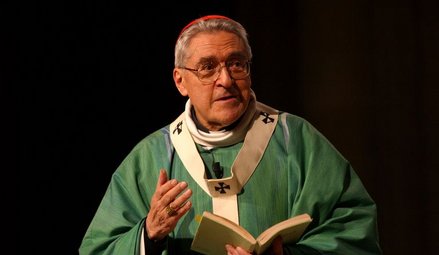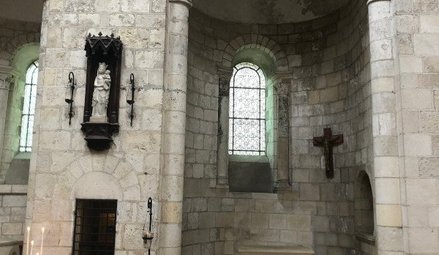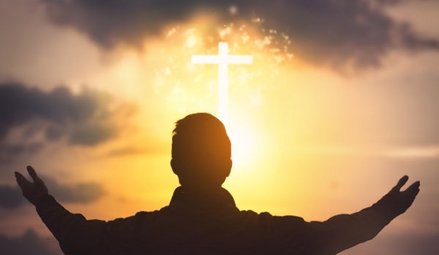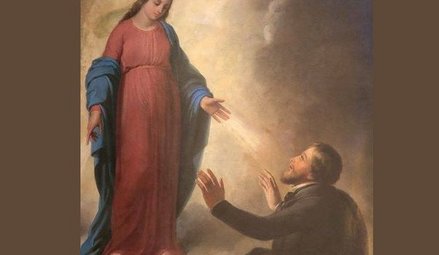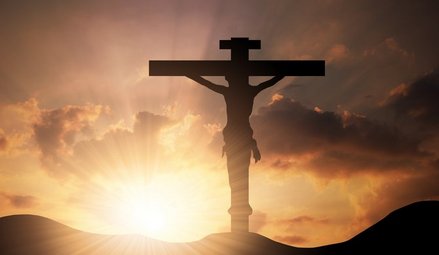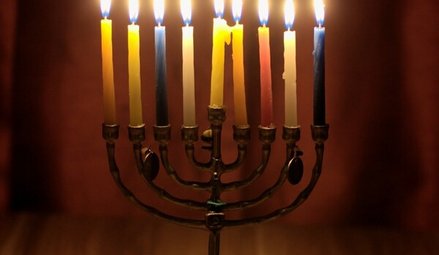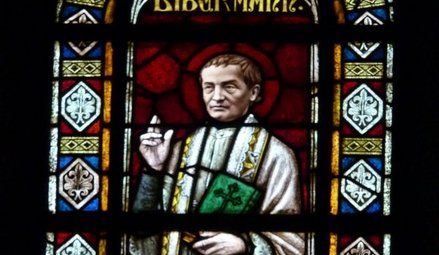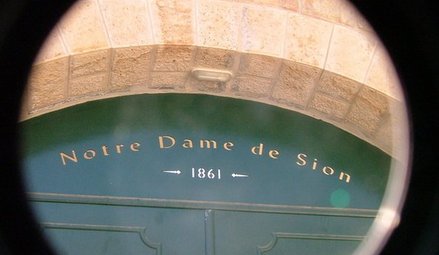- By theme
- Jesus
- The many proofs of Christ’s resurrection
- Saint Thomas Aquinas: God gave all the divine proofs we needed to believe
- The surpassing power of Christ's word
- Lewis’s trilemma: a proof of Jesus’s divinity
- God saves: the power of the holy name of Jesus
- Jesus spoke and acted as God's equal
- Jesus' divinity is actually implied in the Koran
- Jesus came at the perfect time of history
- Rabbinical sources testify to Jesus' miracles
- Mary
- The Church
- The Bible
- An enduring prophecy and a series of miraculous events preventing the reconstruction of the Temple
- The authors of the Gospels were either eyewitnesses or close contacts of those eyewitnesses
- Onomastics support the historical reliability of the Gospels
- The New Testament was not altered
- The New Testament is the best-attested manuscript of Antiquity
- The Gospels were written too early after the facts to be legends
- Archaeological finds confirm the reliability of the New Testament
- The criterion of embarrassment proves that the Gospels tell the truth
- The dissimilarity criterion strengthens the case for the historical reliability of the Gospels
- 84 details in Acts verified by historical and archaeological sources
- The unique prophecies that announced the Messiah
- The time of the coming of the Messiah was accurately prophesied
- The prophet Isaiah's ultra accurate description of the Messiah's sufferings
- Daniel's "Son of Man" is a portrait of Christ
- The Apostles
- Saint Peter, prince of the apostles
- Saint John the Apostle: an Evangelist and Theologian who deserves to be better known (d. 100)
- Saint Matthew, apostle, evangelist and martyr (d. 61)
- James the Just, “brother” of the Lord, apostle and martyr (d. 62 AD)
- Saint Matthias replaces Judas as an apostle (d. 63)
- The martyrs
- The protomartyr Saint Stephen (d. 31)
- Polycarp, bishop of Smyrna, disciple of John and martyr (d. 155)
- Saint Blandina and the Martyrs of Lyon: the fortitude of faith (177 AD)
- Saint Agatha stops a volcano from destroying the city of Catania (d. 251)
- Saint Lucy of Syracuse, virgin and martyr for Christ (d. 304)
- Thomas More: “The king’s good servant, but God’s first”
- The martyrdom of Paul Miki and his companions (d. 1597)
- The martyrs of Angers and Avrillé (1794)
- The Martyrs of Compiègne (1794)
- The Vietnamese martyrs Father Andrew Dung-Lac and his 116 companions (17th-19th centuries)
- He braved torture to atone for his apostasy (d. 1818)
- Blaise Marmoiton: the epic journey of a missionary to New Caledonia (d. 1847)
- José Luis Sanchez del Rio, martyred at age 14 for Christ the King (d. 1928)
- Saint Maximilian Kolbe, Knight of the Immaculate (d. 1941)
- The monks
- The Desert Fathers (3rd century)
- Saint Anthony of the Desert, a father of monasticism (d. 356)
- Saint Benedict, father of Western monasticism (d. 550)
- Saint Bruno the Carthusian (d.1101): the miracle of a hidden life
- Blessed Angelo Agostini Mazzinghi: the Carmelite with flowers pouring from his mouth (d. 1438)
- Monk Abel of Valaam's accurate prophecies about Russia (d. 1841)
- The more than 33,000 miracles of Saint Charbel Maklouf (d. 1898)
- Saint Pio of Pietrelcina (d. 1968): How God worked wonders through "a poor brother who prays"
- The surprising death of Father Emmanuel de Floris (d. 1992)
- The prophecies of Saint Paisios of Mount Athos (d. 1994)
- The saints
- Saints Anne and Joachim, parents of the Virgin Mary (19 BC)
- Saint Nazarius, apostle and martyr (d. 68 or 70)
- Ignatius of Antioch: successor of the apostles and witness to the Gospel (d. 117)
- Saint Gregory the Miracle-Worker (d. 270)
- Saint Martin of Tours: patron saint of France, father of monasticism in Gaul, and the first great leader of Western monasticism (d. 397)
- Saint Lupus, the bishop who saved his city from the Huns (d. 623)
- Saint Dominic of Guzman (d.1221): an athlete of the faith
- Saint Francis, the poor man of Assisi (d. 1226)
- Saint Anthony of Padua: "everyone’s saint"
- Saint Rose of Viterbo or How prayer can transform the world (d. 1252)
- Saint Simon Stock receives the scapular of Mount Carmel from the hands of the Virgin Mary
- The unusual boat of Saint Basil of Ryazan
- Saint Agnes of Montepulciano's complete God-confidence (d. 1317)
- The extraordinary conversion of Michelina of Pesaro
- Saint Peter Thomas (d. 1366): a steadfast trust in the Virgin Mary
- Saint Rita of Cascia: hoping against all hope
- Saint Catherine of Genoa and the Fire of God's love (d. 1510)
- Saint Anthony Mary Zaccaria, physician of bodies and souls (d. 1539)
- Saint Ignatius of Loyola (d. 1556): "For the greater glory of God"
- Brother Alphonsus Rodríguez, SJ: the "holy porter" (d. 1617)
- Martin de Porres returns to speed up his beatification (d. 1639)
- Virginia Centurione Bracelli: When God is the only goal, all difficulties are overcome (d.1651)
- Saint Marie of the Incarnation, "the Teresa of New France" (d.1672)
- St. Francis di Girolamo's gift of reading hearts and souls (d. 1716)
- Rosa Venerini: moving in the ocean of the Will of God (d. 1728)
- Seraphim of Sarov (1759-1833): the purpose of the Christian life is to acquire the Holy Spirit
- Camille de Soyécourt, filled with divine fortitude (d. 1849)
- Bernadette Soubirous, the shepherdess who saw the Virgin Mary (1858)
- Saint John Vianney (d. 1859): the global fame of a humble village priest
- Gabriel of Our Lady of Sorrows, the "Gardener of the Blessed Virgin" (d. 1862)
- Father Gerin, the holy priest of Grenoble (1863)
- Blessed Francisco Palau y Quer: a lover of the Church (d. 1872)
- Saints Louis and Zelie Martin, the parents of Saint Therese of Lisieux (d. 1894 and 1877)
- The supernatural maturity of Francisco Marto, “contemplative consoler of God” (d. 1919)
- Saint Faustina, apostle of the Divine Mercy (d. 1938)
- Brother Marcel Van (d.19659): a "star has risen in the East"
- Doctors
- The mystics
- Lutgardis of Tongeren and the devotion to the Sacred Heart
- Saint Angela of Foligno (d. 1309) and "Lady Poverty"
- Saint John of the Cross: mystic, reformer, poet, and universal psychologist (+1591)
- Blessed Anne of Jesus: a Carmelite nun with mystical gifts (d.1621)
- Catherine Daniélou: a mystical bride of Christ in Brittany
- Saint Margaret Mary sees the "Heart that so loved mankind"
- Mother Yvonne-Aimée of Jesus' predictions concerning the Second World War (1922)
- Sister Josefa Menendez, apostle of divine mercy (d. 1923)
- Edith Royer (d. 1924) and the Sacred Heart Basilica of Montmartre
- Rozalia Celak, a mystic with a very special mission (d. 1944)
- Visionaries
- Saint Perpetua delivers her brother from Purgatory (203)
- María de Jesús de Ágreda, abbess and friend of the King of Spain
- Discovery of the Virgin Mary's house in Ephesus (1891)
- Sister Benigna Consolata: the "Little Secretary of Merciful Love" (d. 1916)
- Maria Valtorta's visions match data from the Israel Meteorological Service (1943)
- Berthe Petit's prophecies about the two world wars (d. 1943)
- Maria Valtorta saw only one pyramid at Giza in her visions... and she was right! (1944)
- The 700 extraordinary visions of the Gospel received by Maria Valtorta (d. 1961)
- The amazing geological accuracy of Maria Valtorta's writings (d. 1961)
- Maria Valtorta's astronomic observations consistent with her dating system
- Discovery of an ancient princely house in Jerusalem, previously revealed to a mystic (d. 1961)
- The popes
- The great witnesses of the faith
- Saint Augustine's conversion: "Why not this very hour make an end to my uncleanness?" (386)
- Thomas Cajetan (d. 1534): a life in service of the truth
- Madame Acarie, "the servant of the servants of God" (d. 1618)
- Blaise Pascal (d.1662): Biblical prophecies are evidence
- Madame Élisabeth and the sweet smell of virtue (d. 1794)
- Jacinta, 10, offers her suffering to save souls from hell (d. 1920)
- Father Jean-Édouard Lamy: "another Curé of Ars" (d. 1931)
- Christian civilisation
- The depth of Christian spirituality
- John of the Cross' Path to perfect union with God based on his own experience
- The dogma of the Trinity: an increasingly better understood truth
- The incoherent arguments against Christianity
- The "New Pentecost": modern day, spectacular outpouring of the Holy Spirit
- The Christian faith explains the diversity of religions
- Cardinal Pierre de Bérulle (d.1629) on the mystery of the Incarnation
- Christ's interventions in history
- Marian apparitions and interventions
- The Life-giving Font of Constantinople
- Our Lady of Virtues saves the city of Rennes in Bretagne (1357)
- Mary stops the plague epidemic at Mount Berico (1426)
- Our Lady of Miracles heals a paralytic in Saronno (1460)
- Cotignac: the first apparitions of the Modern Era (1519)
- Savona: supernatural origin of the devotion to Our Lady of Mercy (1536)
- The Virgin Mary delivers besieged Christians in Cusco, Peru
- The victory of Lepanto and the feast of Our Lady of the Rosary (1571)
- The apparitions to Brother Fiacre (1637)
- The “aldermen's vow”, or the Marian devotion of the people of Lyon (1643)
- Our Lady of Nazareth in Plancoët, Brittany (1644)
- Our Lady of Laghet (1652)
- Saint Joseph’s apparitions in Cotignac, France (1660)
- Heaven confides in a shepherdess of Le Laus (1664-1718)
- Zeitoun, a two-year miracle (1968-1970)
- The Holy Name of Mary and the major victory of Vienna (1683)
- Heaven and earth meet in Colombia: the Las Lajas shrine (1754)
- The five Marian apparitions that traced an "M" over France, and its new pilgrimage route
- A series of Marian apparitions and prophetic messages in Ukraine since the 19th century (1806)
- "Consecrate your parish to the Immaculate Heart of Mary" (1836)
- At La Salette, Mary wept in front of the shepherds (1846)
- Our Lady of Champion, Wisconsin: the first and only approved apparition of Mary in the US (1859)
- Gietrzwald apparitions: heavenly help to a persecuted minority
- The silent apparition of Knock Mhuire in Ireland (1879)
- Mary "Abandoned Mother" appears in a working-class district of Lyon, France (1882)
- The thirty-three apparitions of the Virgin Mary in Beauraing (1932)
- "Our Lady of the Poor" appears eight times in Banneux (1933)
- Fontanelle-Montichiari apparitions of Our Lady "Rosa Mystica" (1947)
- Mary responds to the Vows of the Polish Nation (1956)
- Zeitoun apparitions
- The Virgin Mary comes to France's rescue by appearing at L'Ile Bouchard (1947)
- Maria Esperanza Bianchini and Mary, Mary, Reconciler of Peoples and Nations (1976)
- Luz Amparo and the El Escorial apparitions
- The extraordinary apparitions of Medjugorje and their worldwide impact
- The Virgin Mary prophesied the 1994 Rwandan genocide (1981)
- Our Lady of Soufanieh's apparition and messages to Myrna Nazzour (1982)
- The Virgin Mary heals a teenager, then appears to him dozens of times (1986)
- Seuca, Romania: apparitions and pleas of the Virgin Mary, "Queen of Light" (1995)
- Angels and their manifestations
- Mont Saint-Michel: Heaven watching over France
- Angels give a supernatural belt to the chaste Thomas Aquinas (1243)
- The constant presence of demons and angels in the life of St Frances of Rome (d. 1440)
- Mother Yvonne-Aimée escapes from prison with the help of an angel (1943)
- Saved by Angels: The Miracle on Highway 6 (2008)
- Exorcisms in the name of Christ
- A wave of charity unique in the world
- Saint Peter Nolasco: a life dedicated to ransoming enslaved Christians (d. 1245)
- Saint Angela Merici: Christ came to serve, not to be served (d. 1540)
- Saint John of God: a life dedicated to the care of the poor, sick and those with mental disorders (d. 1550)
- Saint Camillus de Lellis, reformer of hospital care (c. 1560)
- Blessed Alix Le Clerc, encouraged by the Virgin Mary to found schools (d. 1622)
- Saint Vincent de Paul (d. 1660), apostle of charity
- Marguerite Bourgeoys, Montreal's first teacher (d. 1700)
- Frédéric Ozanam, inventor of the Church's social doctrine (d. 1853)
- Damian of Molokai: a leper for Christ (d. 1889)
- Pier Giorgio Frassati (d.1925): heroic charity
- Saint Dulce of the Poor, the Good Angel of Bahia (d. 1992)
- Mother Teresa of Calcutta (d. 1997): an unshakeable faith
- Heidi Baker: Bringing God's love to the poor and forgotten of the world
- Amazing miracles
- The miracle of liquefaction of the blood of St. Januarius (d. 431)
- The miracles of Saint Anthony of Padua (d. 1231)
- Saint Pius V and the miracle of the Crucifix (1565)
- Saint Philip Neri calls a teenager back to life (1583)
- The resurrection of Jérôme Genin (1623)
- Saint Francis de Sales brings back to life a victim of drowning (1623)
- Saint John Bosco and the promise kept beyond the grave (1839)
- The day the sun danced at Fatima (1917)
- Pius XII and the miracle of the sun at the Vatican (1950)
- When Blessed Charles de Foucauld saved a young carpenter named Charle (2016)
- Reinhard Bonnke: 89 million conversions (d. 2019)
- Miraculous cures
- The royal touch: the divine thaumaturgic gift granted to French and English monarchs (11th-19th centuries)
- With 7,500 cases of unexplained cures, Lourdes is unique in the world (1858-today)
- Our Lady at Pellevoisin: "I am all merciful" (1876)
- Mariam, the "little thing of Jesus": a saint from East to West (d.1878)
- Gemma Galgani: healed to atone for sinners' faults (d. 1903)
- The miraculous cure of Blessed Maria Giuseppina Catanea
- The extraordinary healing of Alice Benlian in the Church of the Holy Cross in Damascus (1983)
- The approved miracle for the canonization of Juan Diego Cuauhtlatoatzin (1990)
- Healed by St Charbel Makhlouf, her scars bleed each month for the benefit of unbelievers (1993)
- The miracle that led to Brother André's canonisation (1999)
- Bruce Van Natta's intestinal regrowth: an irrefutable miracle (2007)
- He had “zero” chance of living: a baby's miraculous recovery (2015)
- Manouchak, operated on by Saint Charbel (2016)
- How Maya was cured from cancer at Saint Charbel's tomb (2018)
- Preserved bodies of the saints
- Dying in the odour of sanctity
- The body of Saint Cecilia found incorrupt (d. 230)
- Stanislaus Kostka's burning love for God (d. 1568)
- Blessed Antonio Franco, bishop and defender of the poor (d. 1626)
- The incorrupt body of Marie-Louise Nerbollier, the visionary from Diémoz (d. 1910)
- The great exhumation of Saint Charbel (1950)
- Bilocations
- Inedias
- Levitations
- Lacrimations and miraculous images
- Saint Juan Diego's tilma (1531)
- The Rue du Bac apparitions of the Virgin Mary to St. Catherine Labouré (Paris, 1830)
- Mary weeps in Syracuse (1953)
- Teresa Musco (d.1976): salvation through the Cross
- Soufanieh: A flow of oil from an image of the Virgin Mary, and oozing of oil from the face and hands of Myrna Nazzour (1982)
- The Saidnaya icon exudes a wonderful fragrance (1988)
- Our Lady weeps in a bishop's hands (1995)
- Stigmates
- The venerable Lukarda of Oberweimar shares her spiritual riches with her convent (d. 1309)
- Blessed Maria Grazia Tarallo, mystic and stigmatist (d. 1912)
- Saint Padre Pio: crucified by Love (1918)
- Elena Aiello: "a Eucharistic soul"
- A Holy Triduum with a Syrian mystic, witnessing the sufferings of Christ (1987)
- A Holy Thursday in Soufanieh (2004)
- Eucharistic miracles
- Lanciano: the first and possibly the greatest Eucharistic miracle (750)
- A host came to her: 11-year-old Imelda received Communion and died in ecstasy (1333)
- Faverney's hosts miraculously saved from fire
- A tsunami recedes before the Blessed Sacrament (1906)
- Buenos Aires miraculous host sent to forensic lab, found to be heart muscle (1996)
- Relics
- The Veil of Veronica, known as the Manoppello Image
- For centuries, the Shroud of Turin was the only negative image in the world
- The Holy Tunic of Argenteuil's fascinating history
- Saint Louis (d. 1270) and the relics of the Passion
- The miraculous rescue of the Shroud of Turin (1997)
- A comparative study of the blood present in Christ's relics
- Jews discover the Messiah
- Francis Xavier Samson Libermann, Jewish convert to Catholicism (1824)
- Our Lady of the Miraculous Medal and the conversion of Alphonse Ratisbonne (1842)
- Max Jacob: a liberal gay Jewish artist converts to Catholicism (1909)
- Edith Stein - Saint Benedicta of the Cross: "A daughter of Israel who, during the Nazi persecutions, remained united with faith and love to the Crucified Lord, Jesus Christ, as a Catholic, and to her people as a Jew"
- Patrick Elcabache: a Jew discovers the Messiah after his mother is miraculously cured in the name of Jesus
- Cardinal Aron Jean-Marie Lustiger (d. 2007): Chosen by God
- Muslim conversions
- Buddhist conversions
- Atheist conversions
- The conversion of an executioner during the Terror (1830)
- God woos a poet's heart: the story of Paul Claudel's conversion (1886)
- Dazzled by God: Madeleine Delbrêl's story (1924)
- C.S. Lewis, the reluctant convert (1931)
- The day André Frossard met Christ in Paris (1935)
- MC Solaar's rapper converts after experiencing Jesus' pains on the cross
- Father Sébastien Brière, converted at Medjugorje (2003)
- Franca Sozzani, the "Pope of fashion" who wanted to meet the Pope (2016)
- Nelly Gillant: from Reiki Master to Disciple of Christ (2018)
- Testimonies of encounters with Christ
- Near-death experiences (NDEs) confirm Catholic doctrine on the Four Last Things
- The NDE of Saint Christina the Astonishing, a source of conversion to Christ (1170)
- Jesus audibly calls Alphonsus Liguori to follow him (1723)
- Blessed Dina Bélanger (d. 1929): loving God and letting Jesus and Mary do their job
- Gabrielle Bossis: He and I
- André Levet's conversion in prison
- Journey between heaven and hell: a "near-death experience" (1971)
- Alicja Lenczewska: conversations with Jesus (1985)
- Vassula Ryden and the "True Life in God" (1985)
- Nahed Mahmoud Metwalli: from persecutor to persecuted (1987)
- The Bible verse that converted a young Algerian named Elie (2000)
- Invited to the celestial court: the story of Chantal (2017)
- Providential stories
- The superhuman intuition of Saint Pachomius the Great
- Germanus of Auxerre's prophecy about Saint Genevieve's future mission, and protection of the young woman (446)
- Seven golden stars reveal the future location of the Grande Chartreuse Monastery (1132)
- The supernatural reconciliation of the Duke of Aquitaine (1134)
- Saint Zita and the miracle of the cloak (13th c.)
- Joan of Arc: "the most beautiful story in the world"
- John of Capistrano saves the Church and Europe (1456)
- A celestial music comforts Elisabetta Picenardi on her deathbed (d. 1468)
- Gury of Kazan: freed from his prison by a "great light" (1520)
- The strange adventure of Yves Nicolazic (1623)
- Julien Maunoir miraculously learns Breton (1626)
- Pierre de Keriolet: with Mary, one cannot be lost (1636)
- How Korea evangelized itself (18th century)
- A hundred years before it happened, Saint Andrew Bobola predicted that Poland would be back on the map (1819)
- The prophetic poem about John Paul II (1840)
- Don Bosco's angel dog: Grigio (1854)
- Thérèse of Lisieux saved countless soldiers during the Great War
- Lost for over a century, a Russian icon reappears (1930)
- In 1947, a rosary crusade liberated Austria from the Soviets (1946-1955)
- The discovery of the tomb of Saint Peter in Rome (1949)
- He should have died of hypothermia in Soviet jails (1972)
- God protects a secret agent (1975)
- Flowing lava stops at church doors (1977)
- A protective hand saved John Paul II and led to happy consequences (1981)
- Mary Undoer of Knots: Pope Francis' gift to the world (1986)
- Edmond Fricoteaux's providential discovery of the statue of Our Lady of France (1988)
- The Virgin Mary frees a Vietnamese bishop from prison (1988)
- The miracles of Saint Juliana of Nicomedia (1994)
- Global launch of "Pilgrim Virgins" was made possible by God's Providence (1996)
- The providential finding of the Mary of Nazareth International Center's future site (2000)
- Syrian Monastery shielded from danger multiple times (2011-2020)
- Jesus
- Who are we?
- Make a donation
TOUTES LES RAISONS DE CROIRE
Des juifs découvrent le Messie
n°84
Paris, France
1926-2007
Cardinal Aron Jean-Marie Lustiger: Chosen by God
Cardinal Lustiger has gone down in history not only because of his journey from a Jewish boy named Aron, to an adolescent convert baptized in the Catholic faith and taking the name of Jean-Marie at the age of 14, to priest and later Archbishop of Paris and cardinal, but also because of his influential role in the Church and in the world. More than just a cardinal convert to the faith, with an unusual background, Lustiger was proud of his Jewish origins and described himself as a "fulfilled Jew", a son of Israel called by God to revitalize the Church. Since he wasn't a cradle Catholic and did not owe his reputation to his personal genius, what he became is clearly the result of God's choice and constitutes in itself a reason to believe.

Les raisons d'y croire :
- Lustiger's tenure as Archbishop of Paris spanned nearly a quarter-century (1981-2005). He helped revitalize the Church by carrying out several reforms in the Archdiocese of Paris centered around priests' formation, creating an independent theological faculty in the École cathédrale de Paris, creating Notre-Dame Radio and the KTO television channel, building churches and creating new parishes, launching the Collège des Bernardins... With the Fondation Notre-Dame, he supported charitable and cultural activities.
- He refurbished Notre-Dame de Paris and paid particular attention to the liturgy and sacred music. The quality of his celebrations and especially his homilies filled his cathedral every Sunday evening.
- A Jewish boy who experienced personal and family persecution (his mother was a victim of the Shoah) but who also came to recognize in the crucified and risen Jesus of Nazareth the Messiah awaited by Israel and all humanity, his personal journey gave his preaching an uncommon intensity, where the tragedy of the Cross was inseparable from the inexhaustible mercy of God. His early missions as university chaplain at the Sorbonne and then as parish priest taught him to adapt his presentation of the Christian mystery to his audience.
- At ease and effective in the media, he asserted the place of the Church in society, notably when defending the freedom of Catholic schools, in bioethics debates, in confronting anti-religious secularism, and as a listened-to (even feared) discussion partner of politicians of all stripes.
- He published more than twenty books, including best-sellers, earning him the respect of intellectuals and his election to the Académie française (without having applied!). He had - and has - an international leadership, and was invited to talk by countries from all over Europe, America, Africa and Australia.
- With traditional views - he upheld papal authority in theology and morals - but open to new ideas, attentive to contemporary research and close to Saint John Paul II, he was the main architect of the memorable success of the World Youth Day in Paris in 1997.
- Born Jewish and claiming to remain so, just like the apostles of whom he was one of the successors, he played a major role in bringing Jews and Christians closer together. Firstly, by helping to resolve the problem raised by the Auschwitz Carmel. Secondly, by establishing ties with the major rabbinical schools in New York, whose professors had declined the offer to attend the Second Vatican Council as observers.
Synthèse :
The son of Polish Jews who arrived in France at the beginning of the 20th century, Aron Lustiger discovered the Bible and the Gospel on his own at the age of 12, reading them in secret and immediately grasping the continuity and unity between the Old Testament and the New. His parents were not observant Jews, but the prevailing anti-Semitism of his time made him keenly aware of his Jewish identity.
The family moved to Orléans at the start of the Second World War. On Holy Thursday and Good Friday in 1940, he entered the cathedral without really knowing why. There was no service going on, but he sensed that Christ was the Messiah promised to Israel - and therefore to him too - and that this truth had to be proclaimed. So he felt called to be a priest, in accordance to the name he had received at birth (Aaron the priest of the Old Testament the brother of Moses), and asked to be baptised in the Catholic faith.
Although reluctant, his parents accepted, hoping to spare him discrimination and persecution. And at the end of August, shortly before his 14th birthday, in recently occupied France (the German occupation had started in June of that year) the young Aron chose to "put on Christ" (Galatians 3:27) by adding John and Mary to his name. He was to be known as "Jean-Marie" in the Catholic circles he now belonged to.
His mother remained in Paris to run the family business, was denounced as a Jew, interned at Drancy and deported to Auschwitz, where she was murdered. After taking the baccalaureate examination, which he prepared for at the minor seminary near Paris, Jean-Marie went into hiding to the south of France in 1944 with his father, and joined the Christian resistance movements against Nazism. After the Liberation of France, he enrolled at the Sorbonne university. Fortunately, not all of his teachers were rigidly anti-modern as was the case during the Belle Époque, ignoring the Kant, Hegel, Marx, Nietzsche and Freud that were dominant in the culture at the time. Some of them (such as Jean Daniélou and Louis Bouyer) even promoted the biblical, patristic and liturgical revivals that would make Vatican II possible and enthral Jean-Marie Lustiger, who at the same time updated his knowledge of philosophy and the humanities at the Sorbonne. He graduated from the Sorbonne with a literature degree; entered the seminary of the Carmelite fathers in Paris, and later the Institut Catholique de Paris. He was ordained a priest in 1954. His first assignments was as a student chaplain in Paris at a time when the universities were filled to capacity following the Second World War. It was here, during the first decade of his priestly ministry, that his student interactions instilled a particular zeal for young people in the Church. He first was assistant to Fr. Maxime Charles at the Richelieu Center, which trains university chaplains and counsels lay teachers and students of the grandes écoles, then succeeded him in 1959, retaining his great insights: introduction to theology, the history of Christianity and the thinking of Congar, Chenu, de Lubac, Fessard and Balthasar; well-prepared ceremonies; spiritual retreats; pilgrimages to Chartres, the Holy Land, Assisi and Avila; large gatherings and public debates... But he had to manage the massive increase in student numbers, which led to the creation of new campuses and therefore chaplaincies: Jussieu, Censier, Nanterre, etc.
It was also the time of Vatican II, and the Sorbonne chaplaincy applied the Council's reforms with conviction, having largely anticipated them. In May 68, Georges Pompidou, France's Prime Minister, asked Fr. Lustiger to explain the student revolt to him: Lustiger saw it as a sign of dissatisfaction with the economic growth of the period known as the "Thirty Glorious Years", which Communism (divided between Stalinists and leftists) was unable to take advantage of.
In 1969, after fifteen years at the Sorbonne, Fr. Lustiger accepted the responsibility of a parish: he became the parish priest of Sainte-Jeanne de Chantal at Porte de Saint-Cloud in Paris, after spending the summer backpacking around the United States and watching the first steps of a man on the Moon live on television with his hosts at the time.
In his parish, he mobilized, trained and organized the available lay people so that they could play their part in evangelization. He completely remodelled the interior of his church in a resolutely contemporary style, calling on artist friends such as Jean Touret. With the help of his young organist, Henri Paget, he composed songs whose words were taken from the Scriptures in accordance to the liturgical calendar, so that the faithful could "ruminate" on the Word of God rather than express feelings, however pious. His sermons, meditated on at length but never written out in advance, were soon recorded and transcribed by parishioners who wanted to absorb and share them. He agreed to revise a selection of these homilies so that they could be published in 1978 by the French publishing house Fayard under the title Sermons of a Parish Priest in Paris.
In early summer 1979, however, after ten years at Sainte-Jeanne de Chantal, he wondered what the next step would be for him. At once serene in his fidelity to the doctrine and discipline of the Church, and daring in pastoral, liturgical and aesthetic terms, he had annoyed traditionalists and progressives alike, whom he had not hesitated to criticize openly. At that point he envisioned going to the Holy Land to live as a hermit, or to work as a gardener in a convent.
He was therefore surprised to be offered to shepherd the diocese of Orléans - the city of his baptism! - to succeed Bishop Riobé, the controversial apostle of pacifism. This unexpected offer was made by the papal nuncio in Paris, Mgr Righi-Lambertini, who recognized the correct and energetic positions taken by this extraordinary parish priest. This appointment was probably supported by the auxiliary bishop of Paris, Daniel Pézeril, one of the few intellectuals among the capital's clergy, who was present in 1948 when Georges Bernanos was dying, and who also discerned great potential in this hard-to-categorize priest.
Lustiger then wrote a personal letter to the newly elected John Paul II, asking whether the Pope had been properly informed about his irreversible Jewishness, about what Orléans meant to him, about his differences with his confreres... The answer was not long in coming: yes, all this had been taken into account; and no, there was no reason to question the choice made.
Jean-Marie Lustiger became Bishop of Orléans at the end of 1979. By opening a seminary, he had just enough time to go against the grain of what was generally being done elsewhere, where seminaries were being closed for lack of candidates: he founded a new seminary for training priests, bypassing the existing arrangements. It was a leap of faith: he saw the need to focus on the ministerial priesthood, essential to the sacraments, which, in the words of Father de Lubac, "make the Church".
He had been in Orleans for just over a year, when at the very beginning of 1981, he was asked to return to Paris to take over from Cardinal Marty, who had reached the age of retirement. A successor was hard to find. The matter came to the attention of John Paul II, who decided to send the same cardinal he had just sent to Orléans. Did he remember Fr Lustiger's letter of July 1979? Did he see Lustiger's reply to the questionnaire sent to all the parish priests in Paris to define the challenges facing their next archbishop and, more generally, the Church in France? Had he read the Sermons of a Parish Priest of Paris? In any case, the Pope prayed a lot about this choice, as his secretary Mgr Dziwisz later told Cardinal Lustiger.
The fact remains that, back in Paris, Jean-Marie Lustiger put into practice the principles he had been able to establish and test during his studies, as a youth chaplain, in his parish, and in Orléans - but this time on the much larger scale of an urban and nationally prominent archdiocese with a potentially international impact. He set his focus on the liturgy, which molds and expresses the faith; the training of priests and of lay people; theological work based on Scripture and Tradition, free from philosophical allegiance; creation of communication tools and independent use of the media; dialogue with politicians and with contemporary culture; interventions in ethical debates; large conferences, etc.
His new important position of course opened new avenues. His elevation to the cardinalate in 1983 was merely the formalization of the status associated with the rank. But it also fostered a special relationship with John Paul II, for whom Jean-Marie Lustiger had the admiring affection of a younger brother and who was quick to welcome him whenever he went to Rome for dicastery meetings. These visits to the Vatican also allowed for reciprocal relations and invitations with Cardinal Ratzinger and with archbishops from major cities around the world.
Being a cardinal also prevented Aron Jean-Marie Lustiger from remaining discreet about his Jewish identity. He realized that he was now called upon to embrace it fully and become personally involved in mutual recognition and dialogue between the Chosen People and the Catholic Church. And he succeeded in overcoming the initial prejudices of the most intransigent rabbis.
Finally, he learned patience and humility, especially with the priests he was now called to shepherd and and with whom he sometimes felt at odds. Most of them, however, now came from the seminary he had designed. At age 75, he tended his resignation, in accordance with the rule, but the Pope encouraged him to remain in his role, like him, until the end. However, at the beginning of 2005, the deterioration of his vocal cords, which limited him enormously, led him to retire, after having obtained from John Paul II, shortly before that pope's death, to appoint André Vingt-Trois as his succcessor. The latter had been his vicar at Sainte-Jeanne de Chantal and his auxiliary bishop.
Lustiger's retirement was short-lived: he was diagnosed with cancer in the summer of 2006 and died a year later at the Jeanne Garnier palliative care home, which he himself had founded. He is buried in the cathedral of Notre-Dame de Paris, where the plaque in his memory, which he himself wrote, survived the fire in April 2019.
Jean Duchesne, emeritus professor of English at Condorcet College in Paris, co-founder of the French edition of Communio, and literary executor to Cardinal Lustiger and Fr. Louis Bouyer.
Au-delà des raisons d'y croire :
God never fails to give the Church the pastors it needs. In the words of Maurice Druon, former Permanent Secretary of the Académie française, at Cardinal Lustiger's funeral, he was "the son not of chance, but of exception".
Aller plus loin :
Choosing God, Chosen by God: Conversations With Jean-Marie Cardinal Lustiger, interviews by Jean-Louis Missika and Dominique Wolton, Ignatius Pr; First American edition January 1, 1991 (French original title (French original title Le Choix de Dieu, Éditions de Fallois, 1987)
En savoir plus :- The Promise by Jean-Marie Lustiger, Wm. B. Eerdmans Publishing Co. (October 15, 2007)
- Dare to Live, by Jean-Marie Lustiger, Crossroad Pub Co; 1st US -1st Printing edition (January 1, 1988)
Dare To Believe: Addresses, Sermons, Interviews, 1981-1984 by Jean-Marie Cardinal Lustiger (Author), Nelly Marans (Translator), Maurice Couve de Murville (Translator)
Cardinal Jean-Marie Lustiger on Christians and Jews, by Jean-Marie Lustiger, Paulist Press (March 22, 2013)
Dare To Believe: Addresses, Sermons, Interviews, 1981-1984 by Jean-Marie Cardinal Lustiger (Author), Nelly Marans (Translator), Maurice Couve de Murville (Translator)
Cardinal Jean-Marie Lustiger on Christians and Jews, by Jean-Marie Lustiger, Paulist Press (March 22, 2013)










